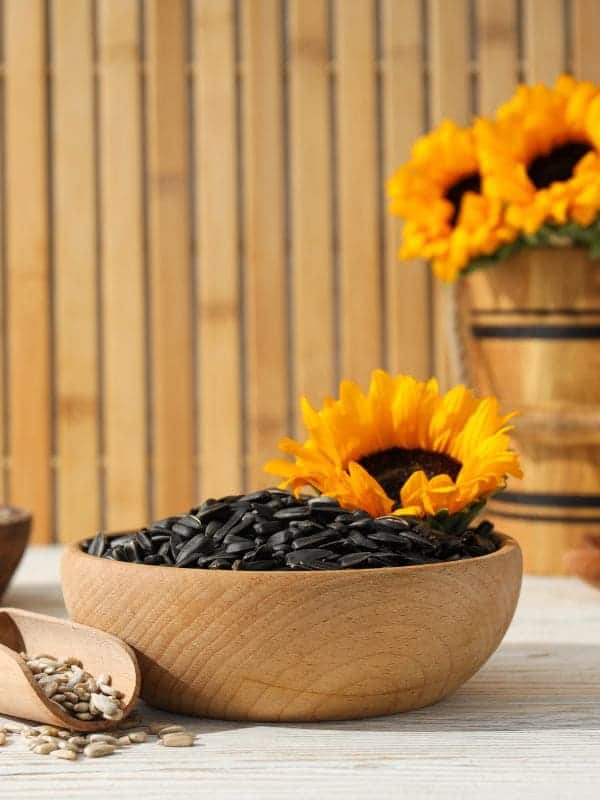How Sunflower Seeds Can Enhance Your Heart Health, Skin, and More

Sunflower seeds (Helianthus annuus) are small but mighty in terms of their health benefits. These tiny seeds are packed with essential nutrients and offer everything from heart health support to skin care. They’re not only a great snack but also an easy addition to various dishes to boost nutrition.
#1. Support Heart Health
Sunflower seeds are a heart-healthy snack thanks to their high content of healthy fats, especially polyunsaturated fats like omega-6 fatty acids. These fats can help improve cholesterol levels by raising HDL (good cholesterol) and lowering LDL (bad cholesterol).
Additionally, sunflower seeds are rich in Vitamin E, an antioxidant that helps prevent oxidative damage to your heart and blood vessels. A 100-gram serving of sunflower seeds provides around 35 mg of Vitamin E (175% of the daily value), which helps reduce inflammation and supports cardiovascular health.

#2. Boost Bone Health
Sunflower seeds are a good source of magnesium, which is essential for maintaining healthy bones and preventing osteoporosis. For instance, 100 grams of sunflower seeds contain approximately 128 mg of magnesium, about 30% of your daily recommended intake.
Research shows that magnesium helps increase bone mineral density, particularly when combined with calcium, which is crucial for bone strength. With regular intake, you can support bone health and reduce the risk of fractures, especially as you age.

#3. Enhance Immune Function
Sunflower seeds are rich in zinc and selenium. Zinc is vital for the development of immune cells, while selenium enhances the body’s ability to fight infections and reduces inflammation.
According to the National Institutes of Health, selenium deficiency is linked to weakened immune function. Fortunately, 100 grams of sunflower seeds contain about 50 mcg of selenium, which supports the immune system and acts as a potent antioxidant.

#4. Promote Healthy Skin
Sunflower seeds are one of the richest sources of Vitamin E, with 35 mg per 100 grams. Vitamin E promotes healthy skin by supporting cell regeneration and improving moisture retention.
A study published in Skin Pharmacology and Physiology highlighted how Vitamin E helps reduce skin damage caused by UV rays and promotes overall skin health.

#5. Regulate Blood Sugar Levels
Sunflower seeds provide about 8-10 grams of fiber per 100 grams, which helps stabilize blood sugar levels. These seeds are fiber-rich, which helps regulate blood sugar by slowing down glucose absorption into the bloodstream.
Additionally, the magnesium in sunflower seeds has been linked to improved insulin sensitivity, which may benefit people with diabetes. According to the American Diabetes Association, sunflower seeds can help lower the risk of developing type 2 diabetes and improve blood sugar management in those already diagnosed.

#6. Improve Mood and Reduce Stress
The magnesium in sunflower seeds also plays a key role in mood regulation and stress management. Magnesium helps relax the nervous system, potentially reducing symptoms of anxiety and depression.
100 grams of sunflower seeds provide about 0.4 mg of folate, which supports brain function and mental well-being. In addition, sunflower seeds contain B vitamins like folate, essential for mental health and combating feelings of fatigue or low mood.

How to Use Sunflower Seeds
- As a snack: Enjoy raw or roasted sunflower seeds as a healthy snack. You can add a pinch of salt or spices for extra flavor.
- In smoothies: Blend sunflower seeds into smoothies for a protein boost and added texture.
- In baking: Add sunflower seeds to bread, muffins, or granola for extra crunch and nutrients.
- Toppings for salads or yogurt: Sprinkle them over your salad, oatmeal, or yogurt for an added nutritional kick.
- Sunflower seed butter: Spread sunflower seed butter on toast or use it as a dip for fruits and veggies.
Cautions and Precautions
Some people may be allergic to sunflower seeds, so be cautious if you’ve had allergic reactions to seeds or nuts in the past.
Sunflower seeds are calorie-dense, so it’s important to watch portion sizes, especially if you’re watching your weight. If you buy salted or roasted sunflower seeds, be mindful of their sodium content, which can contribute to high blood pressure if consumed excessively.
Disclaimer
This article is intended for informational purposes only and should not be considered medical advice. Always consult with a healthcare professional before making significant changes to your diet, especially if you have underlying health conditions or allergies.